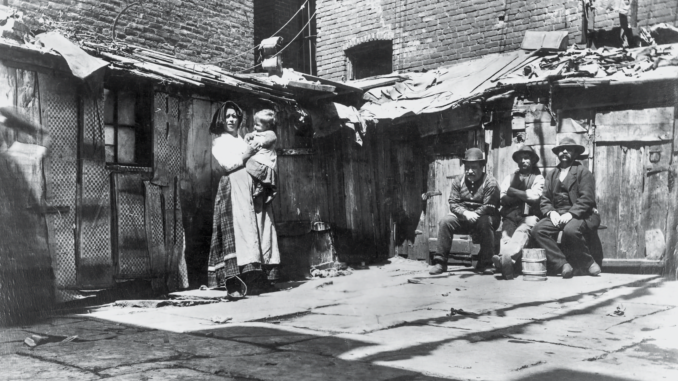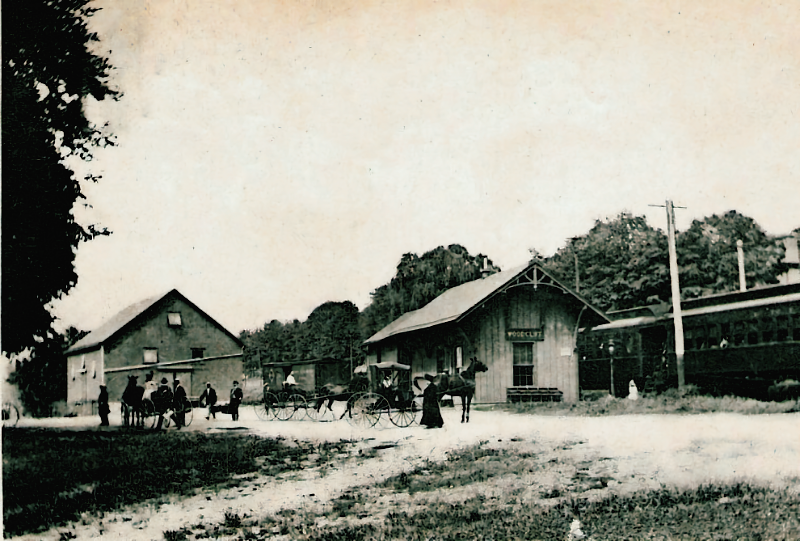
WOODCLIFF—July 12: “Major Glenn, of the Volunteers of America, a warm friend of General Ballington Booth, has arranged to give a week’s outing in the country to mothers and infants from the East Side tenement house districts of New York City. The major has had thirty tents erected on his country place near Woodcliff, which will accommodate as many mothers and babies for a week’s sojourn,” reads a 1901 report in the New-York Tribune.
The abovementioned Woodcliff is now our Woodcliff Lake, and this is the story of how it became a refuge for mothers and their babies in the summer of 1901.
Ballington Booth was the son of former preacher William Booth, who had founded the Salvation Army in England back in 1865. A Christian charity with roots in Methodism, the organization helped destitute Londoners and preached to what the elder Booth called the “down-and-outs” of society—the prostitutes, gamblers, and alcoholics. They called their approach the “three S” system: first soup, then soap, then salvation. Viewing themselves as “God’s Army,” the organization denoted its leadership hierarchy through quasi-military ranks, with Gen. William Booth at the top.
Each of William and Catherine Booth’s eight children was given an officer position in the Salvation Army. Eldest son Bramwell became the chief of staff and succeeded his father as general. Second son Ballington was named colonel and, along with wife Maud, was instrumental in organizing the Salvation Army in the United States in the 1880s. Major Peter Glenn was Col. Ballington Booth’s personal secretary and friend.
In 1896 there was a rift in the Booth family. Ballington and Maud, now American citizens, had made a life for themselves in New York when news came from London that the organization was going to reassign them abroad. Ballington had already been at odds with his older brother, and the dictatorial directive from London appeared to be a tipping point. Ballington left the Salvation Army and started his own organization, the Volunteers of America, giving himself the title of general. Major Glenn followed him in this new venture.

Scottish transplants Major Peter Glenn and wife Elizabeth moved to their farm in Woodcliff Lake sometime between 1895 and 1900. They would have known the area as “Woodcliff” in that decade before the reservoir was created. Their property was on Woodcliff Avenue about midway between Pascack and Wierimus roads. The 1900 U.S. Federal Census has Peter and Elizabeth living at Woodcliff with their three children, Peter, 16, Ruby, 9, and Maud, 5.
Elizabeth Booth had already been active in social work in the slums of New York City, but she brought her work home with her in the summer of 1901. Throughout July and August of that year, under the auspices of the Volunteers of America, the couple turned their Pascack Valley farm into a fresh-air retreat for mothers and babies from the Lower East Side tenements of New York City.
Each of the 30 tents on the Glenn farm provided shelter for one mother and her baby for a week’s time. This was a rare chance to escape the oppressive heat and deplorable conditions of summertime in the slums, and it all came at no cost to the young mothers, including transportation by ferry and rail. Many brought their sick infants, hoping the fresh air would improve their health. The infant death rate in the tenements was one in 10, due to poor sanitation and air quality.
Woodcliff, with only about 300 residents at the time, was a quiet place filled with forests and farmland. For those accustomed to living in the dark, cramped, and suffocating tenement rooms of the Lower East Side, it must have seemed like another world as soon as they stepped off the train at the Woodcliff station.
The Park Ridge Local newspaper wrote of the endeavor, “The Fresh Air Camp on the farm of Major Glenn is evidently a success from the visitors’ point of view. Almost two score women and children from the poorest sections of New York City are receiving a week’s outing at no expense whatever. At 7 o’clock every morning they are turned out onto the farm and spend the entire day out of doors, unless it rains, when the commodious outbuildings furnish them ample accommodations. On Sunday afternoon they attend the open air religious service which the Major conducts. During August, each Sunday at 3 p.m., a different clergyman will take charge of these meetings, thereby adding to the interest in them.”
